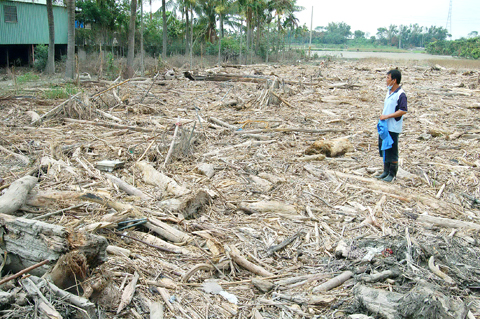Private companies can now go into certain classified post-disaster zones to pick up precious wood that has been washed onto former farmlands or residential areas, helping clean up the zones by shipping the materials away, the Council of Agriculture’s (COA) Forestry Bureau yesterday said.
“Because so much driftwood was washed onto farmlands by [Typhoon] Morakot, we had to allocate all local government resources to clean them out. Now we welcome privately owned firms to help us in the cleanup, and use the wood for use in biomass fuel, creative arts or paper pulps,” bureau section chief Lee Chien-lin (李建霖) said.
The bureau made the announcement in response to vehement complaints by Morakot victims, who have questioned officials as to why wood was considered government property even though it had buried their homes and could be sold for up to NT$100 million (US$3 million) per devastated village.

PHOTO: HUANG LIANG-CHIEH, TAIPEI TIMES
Meanwhile, the bureau said that since Morakot struck, it has been monitoring two barrier lakes that have raised public concern because of their threat to nearby villages.
“We want to let the public know that we have been monitoring two barrier lakes — one in Kaohsiung County’s Namasiya Township (那瑪夏), and the other in Taitung County’s Jinfong Township (金峰), 24 hours a day since they formed,” the bureau’s watershed management committee chief Ku Pei-sen (顧培森) said.
In addition to taking satellite and helicopter images of the two lakes, the bureau has sent local management personnel to the sites to investigate their properties, Ku said.
“After the investigations, ditches have been dug in both lakes to drain the water, so that now the lakes are about 80 centimeters deep, with no danger of bursting onto nearby villages,” he said.
As of Thursday, the estimated agricultural losses from Morakot had reached NT$16.4 billion, nearing the record amount for losses from a storm, which was set in 1996.
The COA said the typhoon, which pummeled Taiwan between Aug. 7 and Aug. 9, caused serious damage to the agricultural sector in 11 counties, with Pingtung, Kaohsiung and Chiayi counties in southern Taiwan the hardest hit.
Losses from Morakot rank second only to the NT$18 billion in agricultural losses caused by Typhoon Herb that struck Taiwan in 1996.
The COA put damage to crops at NT$4.93 billion, with 28 percent of the crops on 82,408 hectares of farmland wiped out or washed away.
Bananas suffered the heaviest damage, with 6,396 hectares ravaged by strong winds and flooding, followed by papayas, guavas, rice, bamboo shoots, orchids, custard apples and leafy vegetables. Bee losses amounted to NT$7.49 million.
The storm also took a heavy toll on animal farms, killing 148,273 pigs, nearly 6.11 million chickens and about 1.54 million ducks, causing losses of NT$1.48 billion, the COA said.
Damage to the aquaculture sector totaled NT$4.17 billion, the highest in 19 years, with stock in some 6,942 hectares of fishponds in coastal areas washed away, it said.
The tallies also show that a total of 5,405 hectares of farmland had been either washed away or inundated, mostly in Pingtung, Kaohsiung and Chiayi counties, bringing total farmland losses to NT$4.77 billion.

The Chinese Communist Party (CCP) is pushing for residents of Kinmen and Lienchiang counties to acquire Chinese ID cards in a bid to “blur national identities,” a source said. The efforts are part of China’s promotion of a “Kinmen-Xiamen twin-city living sphere, including a cross-strait integration pilot zone in China’s Fujian Province,” the source said. “The CCP is already treating residents of these outlying islands as Chinese citizens. It has also intensified its ‘united front’ efforts and infiltration of those islands,” the source said. “There is increasing evidence of espionage in Kinmen, particularly of Taiwanese military personnel being recruited by the

ENTERTAINERS IN CHINA: Taiwanese generally back the government being firm on infiltration and ‘united front’ work,’ the Asia-Pacific Elite Interchange Association said Most people support the government probing Taiwanese entertainers for allegedly “amplifying” the Chinese Communist Party’s propaganda, a survey conducted by the Asia-Pacific Elite Interchange Association showed on Friday. Public support stood at 56.4 percent for action by the Mainland Affairs Council and the Ministry of Culture to enhance scrutiny on Taiwanese performers and artists who have developed careers in China while allegedly adhering to the narrative of Beijing’s propaganda that denigrates or harms Taiwanese sovereignty, the poll showed. Thirty-three percent did not support the action, it showed. The poll showed that 51.5 percent of respondents supported the government’s investigation into Taiwanese who have

South Korean K-pop girl group Blackpink are to make Kaohsiung the first stop on their Asia tour when they perform at Kaohsiung National Stadium on Oct. 18 and 19, the event organizer said yesterday. The upcoming performances will also make Blackpink the first girl group ever to perform twice at the stadium. It will be the group’s third visit to Taiwan to stage a concert. The last time Blackpink held a concert in the city was in March 2023. Their first concert in Taiwan was on March 3, 2019, at NTSU Arena (Linkou Arena). The group’s 2022-2023 “Born Pink” tour set a

A Philippine official has denied allegations of mistreatment of crew members during Philippine authorities’ boarding of a Taiwanese fishing vessel on Monday. Philippine Bureau of Fisheries and Aquatic Resources (BFAR) spokesman Nazario Briguera on Friday said that BFAR law enforcement officers “observed the proper boarding protocols” when they boarded the Taiwanese vessel Sheng Yu Feng (昇漁豐號) and towed it to Basco Port in the Philippines. Briguera’s comments came a day after the Taiwanese captain of the Sheng Yu Feng, Chen Tsung-tun (陳宗頓), held a news conference in Pingtung County and accused the Philippine authorities of mistreatment during the boarding of